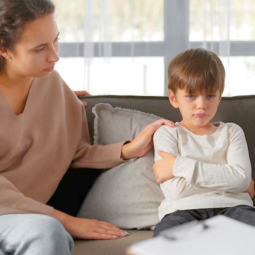- Home
- Conditions We Support
Ready to heal? Explore our personalized therapy and medication approaches
Overview
Child with behaviour issues
Oppositional defiant disorder (ODD) is a childhood behavioral disorder characterized by a persistent pattern of defiant, hostile, and disobedient behavior toward authority figures. Children with ODD often display a recurrent pattern of negativistic, defiant, disobedient, and hostile behavior toward parents, teachers, and other authority figures, which goes beyond normal childhood behavior.
Here are some ways to help manage ODD:
- Parent management training: Parent training programs focus on teaching parents effective strategies for managing challenging behaviors and improving parent-child communication and relationships. These programs may include techniques such as setting clear and consistent limits, using positive reinforcement, implementing consequences for negative behaviors, and promoting positive parent-child interactions.
- Behavioral therapy: Behavioral therapy, such as cognitive-behavioral therapy (CBT) or behavior modification techniques, can help children with ODD learn and practice more adaptive behaviors, develop problem-solving skills, and improve social skills and emotional regulation. Therapists work with children to identify triggers for defiant behavior, challenge negative thought patterns, and develop coping strategies.
- School-based interventions: Collaborating with teachers and school personnel to implement behavioral interventions and supports in the classroom can help address academic and behavioral challenges associated with ODD. Classroom accommodations, behavior management strategies, and social skills training programs can promote positive behavior and academic success.
- Family therapy: Family therapy can help improve communication, conflict resolution, and family dynamics, address underlying family issues contributing to defiant behavior, and strengthen parent-child relationships. Therapists work with families to identify and address sources of stress, improve parenting skills, and promote positive interactions and support.
- Cognitive-behavioral therapy (CBT): CBT techniques can help children with ODD identify and challenge negative thought patterns, develop problem-solving skills, and learn alternative ways of coping with frustration and anger. Therapists work with children to recognize the consequences of their behavior, understand the impact of their actions on others, and develop empathy and perspective-taking skills.
- Social skills training: Social skills training programs focus on teaching children with ODD appropriate ways to interact with peers, resolve conflicts, and regulate emotions. These programs may include role-playing, modeling, and social problem-solving exercises to help children develop effective social skills and interpersonal relationships.
- Medication: In some cases, medication may be prescribed to help manage symptoms of ODD, particularly if the child has co-occurring conditions such as ADHD or mood disorders. Medications such as stimulants, antidepressants, or mood stabilizers may be used to target specific symptoms such as impulsivity, aggression, or mood swings.
It’s important to approach each child with ODD holistically and tailor interventions to their specific needs, strengths, and circumstances. By providing comprehensive, individualized support and interventions, therapists, educators, and parents can help children with ODD learn more adaptive behaviors, improve social and emotional functioning, and achieve greater success in various domains of life.


